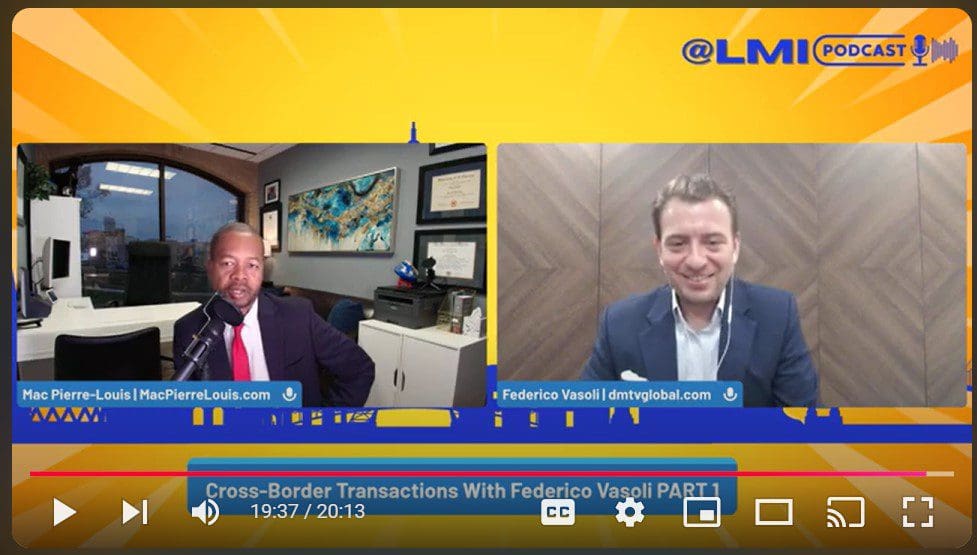EP268 Cross-Border Transactions With Federico Vasoli PART 1

Cross-Border Transactions: The Complexities Businesses Face
In this episode, attorney Mac Pierre-Louis interviews Federico Vasoli, a member of the Committee of International Jurists, about the challenges of cross-border transactions and disputes.
Key Takeaways:
- Cross-border transactions refer to businesses operating or doing deals in jurisdictions outside their home country. This can involve sales, mergers, acquisitions, and other business activities.
- Common issues that arise include differences in laws, regulations, standards, and definitions between countries. This can lead to disputes around things like insolvency, contract enforcement, and data privacy.
- Choosing the right governing law and dispute resolution mechanism (e.g. arbitration vs. local courts) is critical when drafting cross-border agreements.
- Businesses often underestimate the complexities of operating in a new country, such as registration requirements, permits, and deadlines. Seeking legal advice upfront is crucial to avoid costly mistakes.
- The video provides a specific example of an Italian coffee importer facing issues with a Vietnamese supplier due to differences in their contract terms and enforcement mechanisms.
The key message is that cross-border transactions require careful planning and legal expertise to navigate the many potential pitfalls. Businesses should consult lawyers experienced in international matters before entering new markets or deals.
TRANSCRIPT:
Date 2024-12-13
Speaker 1 00:01
Cross-border Transactions with Federico Vasoli, Part 1. That is our topic for today. Welcome to the Lawyers and Mediators International show and podcast where we discuss law and conflict resolution topics to educate both professionals and everyday people. Catch regular episodes on YouTube and anywhere you get your podcast. Just remember nothing in these episodes constitutes legal advice, so be sure to talk to a lawyer as cases are fact dependent. Hey everyone, this is attorney Mac Pierre-Louis, lawyer, mediator, arbitrator working throughout Florida and Texas. And here we had we are back on the LMI podcast talking to Federico Vasoli on cross-border transactions Federico, how are you today?
Speaker 2 00:49
I’m very good, thanks it’s good to be back, Mac. Great to be back on the show with that am I? I’m again back on the show in my capacity as a member and member of the Committee of International Jurists, which is an organization we talked about a couple of episodes ago of lawyers from all over the world, hence the topic cross-border transactions, because it’s really fitting with it. We had Domenic Pini that shares Italian heritage with me and who is English and works in London. Here you can see the various members of International Jurists. So for those viewers and those listeners that have not watched or listened to the previous episode, I would recommend taking a look at that because it links perfectly with today’s episode.
Speaker 1 01:42
Yes, and that episode specifically is episode two hundred sixty four it’s on the channel if people want to check it out, titled What is International Juris? And what we want to do is continue the conversation this time going into cross-border transactions sometimes we in the US might call it international law transactions, international disputes and how to resolve conflicts internationally. But Frederica, what is cross-border transactions mean to you why don’t you get us started? Kind of give us the forest view first.
Speaker 2 02:16
Well, interestingly enough, in my native language, Italian, I would still call it international transactions or international cases or whatever i would use the word international, not cross-border cross-border is an English definition i don’t know whether it stems from the UK or whether it has to do with the European Union, in that the European Union is the strange animal where you have nation states that compose that they’re independent countries that compose a union, which is not a federal country, unlike the US. So probably the term cross-border operations, cross-border transactions, etcetera stems from the fact that if you work between member states of the European Union, it’s not really international even though it is because the legal systems are different, languages are different etcetera, but you’re still part of the same union. So probably, I mean we don’t have Domenic today with us, but if we worked say between my native country, Italy and the UK which is not part of the European Union any longer after Brexit, that would be cross-border could be international in that we’re dealing with a country, the UK, which is not part of the European Union no longer whether whilst if you deal with, I don’t know, Germany and Italy, they’re both parts of the European Union and that is part of the same, of the same structure. But I don’t know whether this term is this definition is fitting anyway. We know what we’re talking about we’re talking about private entities, so individuals or companies or other legal entities that do business with one another so cross-border transactions could mean that somebody sells something to a foreign counterparty or somebody does a business in the sense of setting up operations with that foreign party. It could be merging with that party, could be splitting up from that party, could be acquiring operations in another jurisdictions so essentially we’re talking about doing business in a jurisdictions which is not your home one.
Speaker 1 04:34
Basically, and so what are the typical kinds of cases or typical kinds of disputes that might come up that might come out of cross-border relationships and I whenever I was doing some research for this, I was thinking you’ll see things like fraud, you might see things like insolvency issues, you might see things like breach of contract issues, but could you give us more specific examples even?
Speaker 2 05:00
Oh, absolutely. So what you mentioned is absolutely fitting. Insolvency is typical. You send something to somebody else who is abroad an international jurisdiction and in in another country and you don’t get paid what do you do? But it could also be about specifications. It could be that standards are different in different jurisdictions so lawyers love definitions. And an Italian lawyer’s definition of X could be different from an English lawyer’s definition of X. We’re talking about the same things, but we define them slightly differently. That applies, for instance, to previously regulations. Everybody is, almost everybody is quite familiar with the GPR, the European Regulation on the Protection of Personal Data. That has been implemented in all European countries, but certain countries have implemented it in a stricter fashion. Now again, the European Union is this jurisdiction where you might have some very similar pieces of legislation that are implemented in a tighter way in various Member States but I want to over complicate things to answer your question it is about insolvency, it is about standards, it is about enforcing certain rights, it is about notifications. How do you get hold of someone from the other side of the world, from the other or even just cross-border as we said, what are the qualifying majorities, voting rights, etcetera in a company, in a corporate operation. So yeah, these are the typical aspects that we see and a topical, topical aspect is what governing law do you choose and again, let me link up to the previous episodes that were recorded probably one or two years ago already with you about having a properly drafted written agreement in place that defines what laws applies, what the rules of the game are, and what happens in case those rules are not upheld and something goes wrong where do you go to court? You have an issue at home, You go to your home jurisdiction, you go to your home judge. But if you’re a party, if the other party is somewhere else, cross-border so crossing the border, where do you go do you go to their home do you play in your jurisdiction and try and force whatever centres or instruments you get in your home jurisdiction abroad? These are various aspects to take into account that comes up.
Speaker 1 07:49
You mentioned past videos where we have discussed this and if people are interested, they should go back to your old, old recordings. How can I say old, old, like it’s only a couple years ago where you, you discuss, you know, the why people should spend the time and they’re very beginning to decide jurisdictional issues from the very offset when they’re going to start these agreements. When you’re dealing with two different countries or multiple countries, multiple jurisdictions, because it might be advantageous right to begin a contract that has your jurisdiction at heart, because in the long run, it you might prefer your courts, you know, to be the ones who deal with the issues. And so, but just saying that to let people know they need to go back and watch those old videos. But tell us, can you share a story, a specific example, because a lot of this can sometimes be a little theoretical.
Speaker 2 08:51
I’ll give you one yeah, yeah. I’ll give you a very, I’ll give you a very concrete example coffee. I’m a big coffee drinker I’m Italian. Coffee is very popular in America for American listeners. Coffee is very popular in Vietnam, where I’m recording this episode from. Vietnam is one of the largest exporters of coffee in the world, probably number two after Brazil. Now we have a client in Italy that is a large importer of coffee from Vietnam. They are members of an International Federation, International Association of coffee importers and exporters, pretty much like international jewels for for lawyers if you want. And they found many, many years ago an exporter of coffee from Vietnam. They never had issues with them. And once they started buying coffee from Vietnam, from this specific exporter, they decided to refer to the template agreement of their association so the association has employed lawyers that devised a standard sale and purchase agreement of coffee with a number of clauses. And they said, well, we’re part of this federation, let us use this template agreement. No need to discuss. We are members of it let’s let’s use it somebody has discussed it for us in the past. That’s it bingo no problem whatsoever. Now a few years down the line, there was a problem that is the Vietnamese also due to number of climatic, environmental, etcetera aspects that caused scarcity in crops or or beans, whatever you call it in in essence, in the production of coffee in Vietnam, they did not deliver the amount of coffee that was ordered and paid for in advance by the Italian importers. What do you do you refer to the contract say, well, what does the contract say when the situation occur, the seller has not delivered enough coffee we paid for one ton and we got half a ton of coffee or we didn’t get a ton at all, or the ton of coffee that we paid for was delivered late. So we needed to buy the same quantity from other sources in order to make up for our end customers that would not get the coffee from us problem the seller is not part of that association of that organization oops so we questioned the validity of that very template that they decided to adopt. So well, never mind, there are exchanges of emos, dangerous and nowadays also other means of messaging, which I would strongly discourage businesses to use anyway. So well, what happens in case of dispute what do we do? Arbitration this standard template says that if there is a dispute you can go to. You can opt for arbitration in either London or The Hague or Amsterdam, don’t remember in the Netherlands anyway. Now that is highly problematic because from a formal standpoint a an arbitral clause must be in writing and expressly proved by the parties. Now, if I were the lawyer of the sellers from Vietnam, I would question the validity of this pact, that is to go for arbitration, either London or or Amstone, whatever, because it was not signed, it was not discussed. So what do you do? Probably this contract is not valid. In the 1st place, there are concrete elements that demonstrate that the Italians have paid and that the Vietnamese have sold for a number of years. But the text that they’re referring to was not formally adopted, at least not from a Vietnamese standpoint. So that makes the situation quite complicated and that’s just one of the main examples. This is quite complicated, I know for for our listeners, viewers and I spoke a lot about it but it’s to tell you how a very simple thing like trading a commodity like coffee can pour can can can be quite problematic. There are simpler cases there are situations whereby you have an agreement with say China is the factory of the world or used to be the factory of the world. You buy something from China. In China, it used to be mandatory for companies to not just sign an agreement, but to have it stamped with the so-called company, chop the company seal. It so happened years ago now the situation has changed, but it so happened years ago that maybe the Chinese willingly or a willingly would not use the company chop. So the contract was perfectly drafted, was beautiful i would have liked it, but then somebody did not it it was like not signing it. You have a fantastic contract, you can sign it the Chinese did sign it but did not stamp it, so it was not enforceable. That is another problem that we face. There is a wealth of examples that I could make, but let’s start with these two just to lay the foundations of this discussion that will probably involve a second part as we said in the beginning, this is Part 1 only.
Speaker 1 13:57
You know, thank you. And I think a lot of the member attorneys of International Jurists would probably have similar, you know, fact patterns, right, similar cases. So when it comes to you know you individual lawyers then advising your clients, what are some ways you typically advise your clients when it comes to cross-border complexities?
Speaker 2 14:20
Well, first of all is to define who the parties are this is, I believe the, it looks like a stupid thing, but it’s not that is, you may have companies that operate, that have facilities, factories, logistics in a certain jurisdiction, but reality is that the legal entity is incorporated elsewhere. It typically happens in America you have companies that operate out of, I don’t know, California or Texas, but they’re incorporate in Delaware for tax, yeah. Or or Wyoming or whatever for, for tax purposes so who is your party who, who is your client and who is the party now, based on that, you can study the present jurisdiction, the present legislation, sorry, and find out whether there are any agreements on the recognition of sentences between the two jurisdictions. So, for instance, again, I keep on quoting Vietnam, but that’s where I, I work most of my time. Vietnam and many countries like Italy do not have a specific agreement on the, on the recognition of and enforcement of sentences. So you can have the most beautiful country in the world go to court in Italy, win in Italy, and then that sentence is worth less than the paper it is written on because there is no agreement with Vietnam for the recognition and enforcement of it. So the first thing is to check who the parties are and if there is any agreement between the home jurisdictions of the two parties for the recognition of their rights and obligations and what instruments typically are used. So with Vietnam, for instance, I would always recommend to go for arbitration where possible now it is not possible in 100 % of cases we talked about arbitration in previous episodes, but that is something that I would recommend. And even with more mainstream jurisdictions, I would check for instance, Singapore is another jurisdictions that I work in extensively as my firm is headquartered there. Now a lot of businesses want to use want to use Singapore the the Singapore to national Arbitration Centre, which is very prestigious it works fantastically well, don’t get me wrong, but it is blood expensive. So for a small case, it may be worth drafting a multi step clause that says look until a certain value. Let’s not go for arbitration to expense let’s try mediation for instance, or let’s go to ordinary courts. Courts in Singapore are very efficient, they’re quick. So the the the element of speed which is often used for a case for arbitration is not really there courts are good so why would you resort for arbitration if a Singaporean court is equally fast? So yeah, these are the first elements that I would consider. And then I would look at where the money is, where would you go if the company, again, if the holding, if the the company is incorporated in a place they then or elsewhere where you don’t really have assets, maybe that’s dangerous because again, you can win the case, it could be enforceable, but then you would need to seize assets elsewhere. They’re not located in the headquarters so probably you would also want to look at joint liability, joint responsibility by affiliates of the party. But here we’re getting into more complicated stuff that we might want to delve into and in Part 2, but these are the first things that I will look at.
Speaker 1 17:39
Got it. And so, you know, makes me think one of the reasons we do these episodes on this channel is to educate people, right to give people knowledge. Would you agree with me that whenever it comes to cross-border transactions and the complexities that might come in, the problems people might have and the reason they need to get lawyers for their businesses? Would you agree with me that for a lot of these kind of cases, people don’t know the problems they’re going to have until they get there? And so this is This is why people therefore need to kind of hear the good, bad and ugly in the very beginning so that they. Yeah, yeah what do think?
Speaker 2 18:19
Think I, I, I absolutely agree with you and we have talked about contracts, but we have not touched upon investments, which is probably even more difficult so cross-border operation meaning setting up a company elsewhere. We talked about setting up a business in Vietnam in previous episodes with me. This can be extremely complicated because you you may think that it works like in your home jurisdiction. Oops it does not. You have to meet certain deadlines that you’re not aware of. You need to produce certain pieces of documentation that you’re not aware of you need to translate documents, have them notarized, etcetera. You need to ask for special permits that you wouldn’t need, that you wouldn’t know, you wouldn’t need. So that becomes even more complicated and that is again, cross-border well, transactions, cross-border operations in this case. Or maybe you would need to ask for a government authorization in order to in order to take over a company or proceed with an M&A deal. These are things that are often overlooked you say, well, this market is fantastic, let’s go there let’s invest and buy over a company. Not so easy.
Speaker 1 19:30
No, no, absolutely. If you don’t know what you don’t know, then it’s it’s disaster and so that’s why you go to people like lawyers on International Jurists to kind of give you the heads up before you walk into a trap in ways you don’t realize yet. So anyway, that’s why we do this, right? Ok Federico, thank you so much for this talk on cross-border transactions. And we will continue with Part 2 next week, all right.
Speaker 2 19:58
Looking forward. Thank you all right, man.
Speaker 1 19:59
Take care, bye bye.
Speaker 2 20:01
Thank you.



